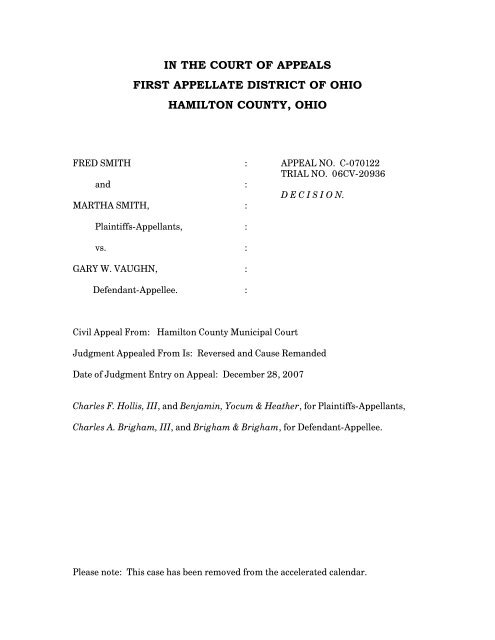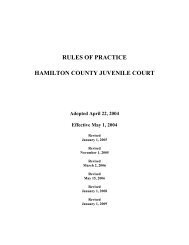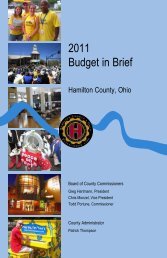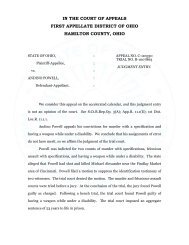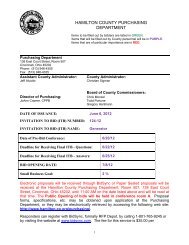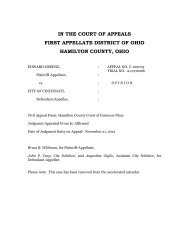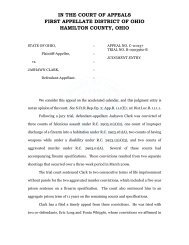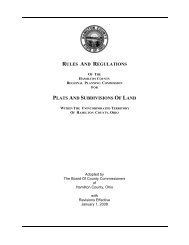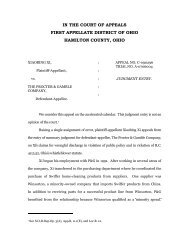Create successful ePaper yourself
Turn your PDF publications into a flip-book with our unique Google optimized e-Paper software.
IN THE COURT OF APPEALSFIRST APPELLATE DISTRICT OF OHIOHAMILTON COUNTY, OHIOFRED SMITHandMARTHA SMITH,Plaintiffs-Appellants,vs.GARY W. VAUGHN,Defendant-Appellee.:::::::APPEAL NO. C-070122TRIAL NO. 06CV-20936D E C I S I O N.Civil Appeal From: <strong>Hamilton</strong> <strong>County</strong> Municipal CourtJudgment Appealed From Is: Reversed and Cause RemandedDate of Judgment Entry on Appeal: December 28, 2007Charles F. Hollis, III, and Benjamin, Yocum & Heather, for Plaintiffs-Appellants,Charles A. Brigham, III, and Brigham & Brigham, for Defendant-Appellee.Please note: This case has been removed from the accelerated calendar.
OHIO FIRST DISTRICT COURT OF APPEALSSYLVIA SIEVE HENDON, Judge.{1} This case arose out of a disputed debt. Defendant-appellee Gary<strong>Vaughn</strong> signed a document stating that plaintiffs-appellants Fred and Martha <strong>Smith</strong>were loaning him $9,900 to be repaid “when you can.” Approximately 18 monthslater, the <strong>Smith</strong>s sued <strong>Vaughn</strong> for the entire amount, claiming default on the note aswell as unjust enrichment. The <strong>Smith</strong>s moved for summary judgment. Theycontended that <strong>Vaughn</strong> was immediately liable for the entire amount but that theywere willing to work out a repayment schedule. <strong>Vaughn</strong> also moved for summaryjudgment, arguing that he did not have to repay the <strong>Smith</strong>s because he did not havethe ability to do so. The trial court denied the <strong>Smith</strong>s’ motion and granted <strong>Vaughn</strong>’s.The <strong>Smith</strong>s now appeal. We reverse.{2} In their first and second assignments of error, the <strong>Smith</strong>s arguerespectively that the trial court should have granted their motion for summaryjudgment as to liability and that the court should have denied <strong>Vaughn</strong>’s crossmotion.{3} This court reviews the granting of summary judgment de novo. 1Summary judgment is appropriate if (1) no genuine issue of any material factremains, (2) the moving party is entitled to judgment as a matter of law, and (3) itappears from the evidence that reasonable minds can come to but one conclusion,and with the evidence construed most strongly in favor of the nonmoving party, that1 Grafton v. <strong>Ohio</strong> Edison Co. (1996), 77 <strong>Ohio</strong> St.3d 102, 105, 671 N.E.2d 241.2
OHIO FIRST DISTRICT COURT OF APPEALSconclusion is adverse to the party against whom the motion for summary judgment ismade. 2{4} The <strong>Smith</strong>s and <strong>Vaughn</strong> agree that the terms of the promissory notecontrol in this case. They argue, however, over what law applies to determine themeaning of the phrase “when you can.” The <strong>Smith</strong>s contend that the note waspayable on demand and that it was a negotiable instrument. It was neither. Aninstrument is payable on demand if it states that it is, or if no time is specified forrepayment. 3 Here, “when you can” was when payment was due. This was not theequivalent of completely failing to identify a repayment date. And this conditionalterm of repayment destroyed negotiability. 4 This argument has no merit.{5} <strong>Vaughn</strong>, in turn, argues that he had to repay the <strong>Smith</strong>s only if theycould demonstrate that he had the ability to pay. But the cases cited by <strong>Vaughn</strong>,namely North Market Assn. v. Case 5 and <strong>Smith</strong> v. Shoemaker, 6 ignore the <strong>Ohio</strong>Supreme Court case of Lewis v. Tipton. 7 In that case, Lewis agreed to pay Tipton$95 “when I can make it convenient, with ten per cent interest until paid.” 8 The courtheld that the words “when I can make it convenient” evidenced the intent of theparties to make the note payable within a reasonable time, and that the “reasonabletime” was “to be determined in view of all the circumstances,” not just by theobligor’s ability to pay. 92 Civ.R. 56(C); Temple v. Wean United, Inc. (1977), 50 <strong>Ohio</strong> St.2d 317, 327, 364 N.E.2d 267; see,also, Dresher v. Burt, 75 <strong>Ohio</strong> St.3d 280, 293, 1996-<strong>Ohio</strong>-107, 662 N.E.2d 264.3 R.C. 1303.07(A); see, also, Ranieri v. Terzano (1983), 8 <strong>Ohio</strong> App.3d 438, 441, 457 N.E.2d 906.4 See R.C. 1303.03(A)(2).5 (1955), 99 <strong>Ohio</strong> App. 187, 132 N.E.2d 122.6 (1959), 81 <strong>Ohio</strong> Law Abs. 451, 162 N.E.2d 237.7 (1859), 10 <strong>Ohio</strong> St. 88.8 Id. at syllabus.9 Id. at 91.3
OHIO FIRST DISTRICT COURT OF APPEALS{6} There is little case law applying the Tipton rule. But cases governingcontract disputes lend some guidance as to what factors a court should examine inconcluding what constitutes a “reasonable” time for performance.{7} The Tenth Appellate District has determined that a reasonableamount of time “is not measured by hours, days, weeks, months or years.” 10 Instead,the trier of fact “should ascertain the parties’ original expectations and thecircumstances surrounding the execution of the agreement.” 11 In addition to theseconsiderations, the Seventh Appellate District has stated that the trier of fact shouldexamine all factors “ordinary and extraordinary.” 12 We find these cases to bepersuasive. And we add that an obligor’s ability to pay must also be a part of thecourt’s determination of reasonableness, since the ability to pay is part of “all thecircumstances.”{8} Applying the law to the facts of this case, we uphold the court’s denialof the <strong>Smith</strong>s’ motion for summary judgment. The <strong>Smith</strong>s did not support theirmotion with evidentiary materials concerning the totality of the circumstances. Weoverrule the first assignment of error.{9} But we are compelled as a matter of law to reverse the trial court’sjudgment in favor of <strong>Vaughn</strong>. In support of his motion, <strong>Vaughn</strong> attached only hisown affidavit stating that he had encountered some financial difficulties in the past,was presently employed, and had attempted to repay the <strong>Smith</strong>s a small fraction ofwhat he owed. Considering the very broad test for “reasonableness,” we hold that<strong>Vaughn</strong> had failed to establish the absence of a genuine issue of fact concerning10 Morton Buildings, Inc. v. Correct Custom Drywall, Inc., 10 th Dist. No. 06AP-851, 2007-<strong>Ohio</strong>-2788, 1711 Id. at 18.12 Cionni v. Reid (July 25, 1991), 7 th Dist. No. 90-J-19.4
OHIO FIRST DISTRICT COURT OF APPEALSwhether it was reasonable for him to repay the <strong>Smith</strong>s. The second assignment oferror is sustained.{10} In their third and final assignment of error, the <strong>Smith</strong>s contend thatthe trial court erred in granting <strong>Vaughn</strong>’s motion for summary judgment on theirclaim for unjust enrichment. This assignment also has merit. Unjust enrichmentoccurs where “ ‘a person has and retains money or benefits which in justice and inequity belong to another.’ ” 13 To prevail on a claim of restitution based upon unjustenrichment, a plaintiff must establish “(1) a benefit conferred by a plaintiff upon adefendant; (2) knowledge by the defendant of the benefit; and (3) retention of thebenefit by the defendant under circumstances where it would be unjust to do sowithout payment.” 14{11} <strong>Vaughn</strong>’s motion for summary judgment was not supported bysufficient evidentiary materials to demonstrate the absence of a genuine issue ofmaterial fact concerning the essential elements of the unjust-enrichment claim. The<strong>Smith</strong>s’ third assignment of error is sustained.{12} In sum, the judgment of the trial court granting <strong>Vaughn</strong>’s motion forsummary judgment is reversed. This case is remanded for further proceedingsconsistent with this decision.Judgment reversed and cause remanded.PAINTER, P.J., and DINKLEACKER, J., concur.Please Note:The court has recorded its own entry on the date of the release of this decision.13 Johnson v. Microsoft Corp., 106 <strong>Ohio</strong> St.3d. 228, 2005-<strong>Ohio</strong>-4985, 834 N.E.2d 791, 20,quoting Hummel v. Hummel (1938), 103 <strong>Ohio</strong> St. 520, 528, 14 N.E.2d 923.14 Id., citing Hambleton v. R.G. Barry Corp. (1984), 12 <strong>Ohio</strong> St.3d 179, 183, 465 N.E.2d 1298.5


